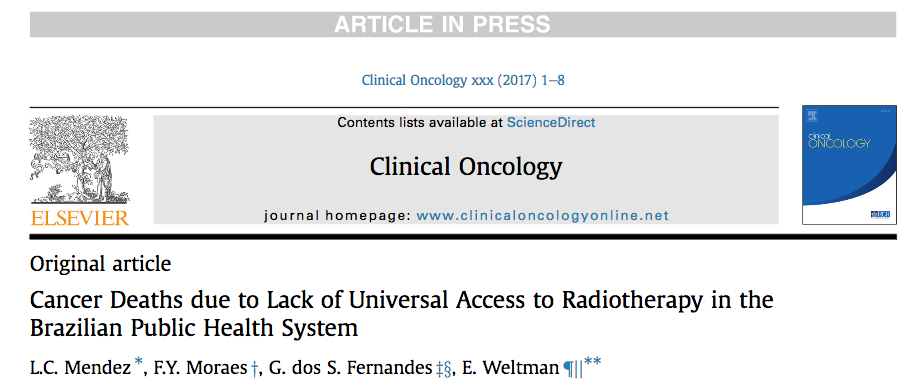L.C.Mendez; F.Y.Moraes; G. dos S.Fernandes; E.Weltman
Sociedade Brasileira de Oncologia Clínica
Sociedade Brasileira de Radioterapia
Aims
Radiotherapy plays a fundamental role in the treatment of cancer. Currently, the Brazilian public health system cannot match the national radiotherapy demand and many patients requiring radiotherapy are never exposed to this treatment. This study estimated the number of preventable deaths in the public health system if access to radiotherapy was universal.
Materials and methods
Incidence rates for the year 2016 provided by Instituto Nacional de Cancer were used in this analysis. The number of untreated patients requiring radiotherapy was obtained through the difference between the total number of patients requiring radiotherapy and the total amount of delivered radiotherapy treatments in the public health system. The number of deaths for the three most common cancers in each gender due to radiotherapy shortage was calculated. Initially, the total number of patients per cancer type was divided in stages using Brazilian epidemiological data. Subsequently, previously published tree arm diagrams were used to define the rate of patients requiring radiotherapy in each specific clinical setting. Finally, the clinical benefit of radiotherapy in overall survival was extracted from studies with level 1 evidence.
Results
Over 596 000 cancer cases were expected in Brazil in 2016. The public health system covers more than 75% of the Brazilian population and an estimated 111 432 patients who required radiotherapy in 2016 did not receive this treatment. Breast, colorectal and cervix cancers are the most frequent malignant tumours in women and prostate, lung and colorectal in men. The number of deaths due to a radiotherapy shortage in the year 2016 for these types of cancer were: (i) breast: 1011 deaths in 10 years; (ii) cervix: 2006 deaths in 2 years; (iii) lung: 1206 deaths in 2 years; (iv) prostate, intermediate risk: 562 deaths in 13 years; high risk: 298 deaths in 10 years; (v) colorectal: 0 deaths, as radiotherapy has no proven benefit in overall survival.
Conclusion
Thousands of cancer patients requiring radiotherapy do not have access to this treatment in the Brazilian public health system. The shortage of radiotherapy has a significant detrimental effect on cancer survival; over 5000 deaths would probably be prevented in the most common cancer types if radiotherapy access was universal.
https://doi.org/10.1016/j.clon.2017.09.003
http://www.clinicaloncologyonline.net/article/S0936-6555(17)30427-2/fulltext

